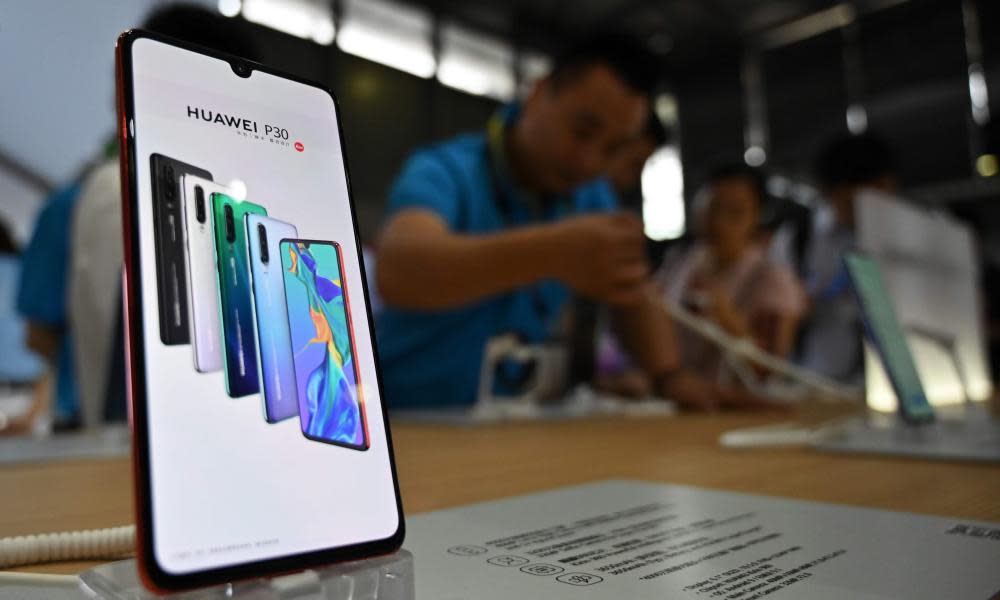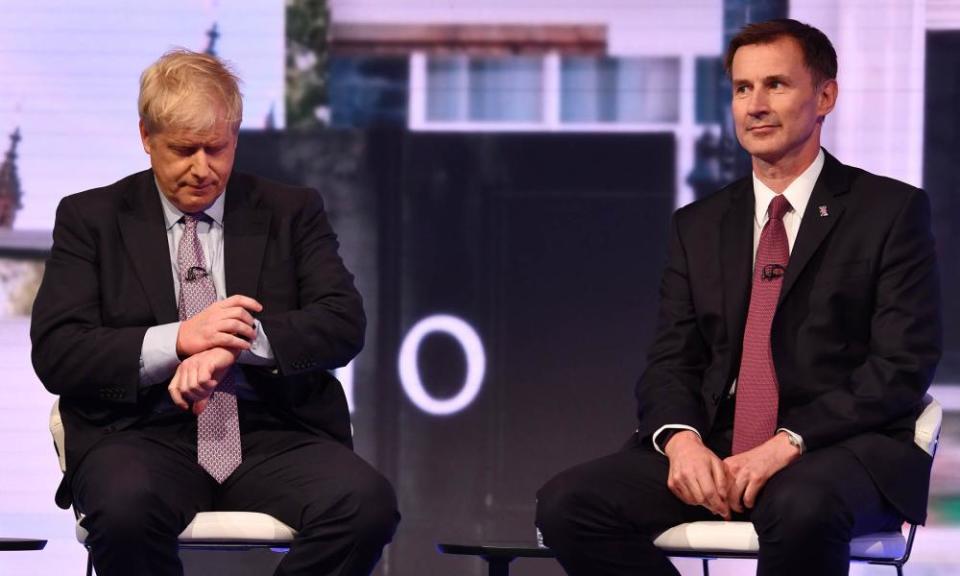Johnson and Hunt to be pressed on Huawei stance in hustings

Boris Johnson and Jeremy Hunt will be pressed on whether Chinese company Huawei should be banned from supplying 5G network technology, at a Conservative party hustings to be held on the Isle of Wight.
The island’s Conservative MP, Bob Seely, wants the contenders to clarify how they would deal with the telecoms firm, after he obtained a leaked copy of a legal memo that he argued undermined its claim it was independent of the Chinese state.
“We need clear political leadership,” Seely said ahead of the meeting on Thursday afternoon. “I want the candidates to assert the importance of our own western values, the importance of open and free societies and to exclude Huawei.”
The MP has been campaigning for a total ban on Huawei for several weeks, after it emerged that Theresa May was minded to allow the company to supply 5G kit to “non core” parts of the network following a leak from a fraught national security council meeting.
The leak of that decision in principle prompted several Tories to protest, arguing that a Chinese company should not be allowed to supply critical technology because it could be subverted and used for surveillance. Gavin Williamson was fired as defence secretary after May concluded he was responsible for the leak.
A final decision on Huawei is due to be made under the new prime minister, after the Trump administration lobbied intensively for it to be reversed in the run-up to the US president’s visit to the UK last month.
Johnson has said little about Huawei, although advisers had indicated he was likely to reverse the decision, while Hunt has previously said the UK should exercise “a degree of caution” about large Chinese companies.
The legal memo sent to Seely was produced by international law firm Clifford Chance, and is a review of “whether Chinese laws authorise the Chinese government to order manufacturers to hack into products they make to spy on disable communications”.
The law firm was cited by John Suffolk, Huawei’s global cybersecurity and privacy officer, in testimony to parliament earlier this month in support of the company’s opinion that Chinese law “doesn’t require Huawei to undertake anything that weakens Huawei’s position in terms of security”.

The leaked legal memo, dated November 2018, concludes that China’s five intelligence, state security and counter terror laws “do not appear to have extraterritorial effect” outside the Asian country. But Seely said that the memo’s value was undermined by the disclaimer at the end of the document, which concluded that it “should not be construed as constituting a legal opinion on the application of PRC [Chinese] law”.
The document itself makes clear that Clifford Chance is reviewing another legal analysis prepared by Zhong Lun, a Chinese law firm. It says that it “independently assessed the analysis and supporting materials” Zhong Lun provided.
“My view is that this is not the first time that promises involving Huawei have turned out not be what they first appeared. It says it is a private company, but is dependent Chinese law; it promises not to spy but it is not clear this is worth the paper it is written on,” Seely said.
Huawei is 99% owned by a trade union council representing its Chinese employees. The company also told MPs on a parliamentary committee that had gone through “a period of clarification” with the Chinese government over the meaning and application of the country’s intelligence and security laws.
Referring to the legal memo, Suffolk said: “We’ve had that validated via our lawyers and revalidated by Clifford Chance ... according to our legal advice, that does not require Huawei to undertake anything that weakens Huawei’s position in terms of security.”
Huawei effectively responded by releasing a white paper on innovation and intellectual property with a warning from its chief legal officer Song Liuping that “if politicians use intellectual property as a political tool” then “they will destroy confidence in the patent protection system”.
The document released by Song said the company respected trade secrets and intellectual property, saying that all employees had to sign a agreement to respect “the confidential information of other companies and individuals”. It was “willing to share our technology with the world,” Song added, and “that includes 5G” as long as other countries were willing to play by the rules.
Separately, Julian Lewis, the Conservative chair of the defence select committee wrote to both candidates asking them to clarify their positions on future spending for the armed forces. Hunt has previously promised to raise the level of spending from the current 2% to 2.5% of GDP, an increase of around £15bn in cash terms.

 Yahoo News
Yahoo News 
